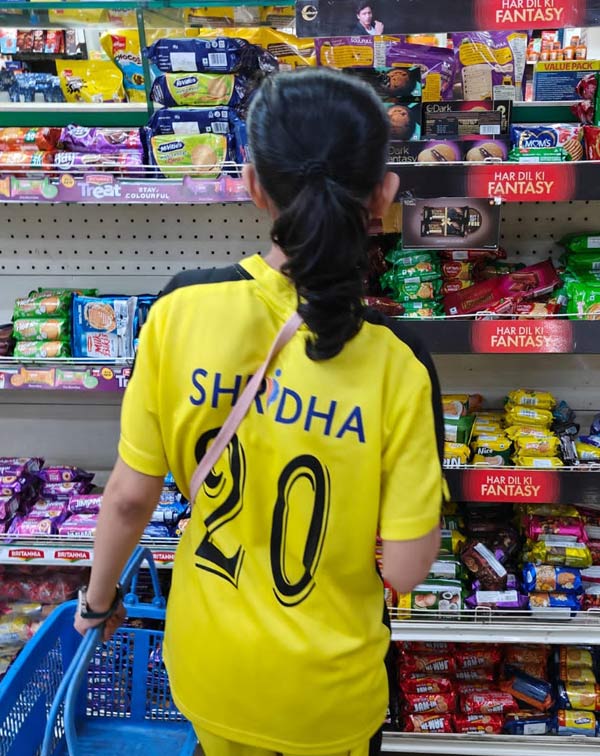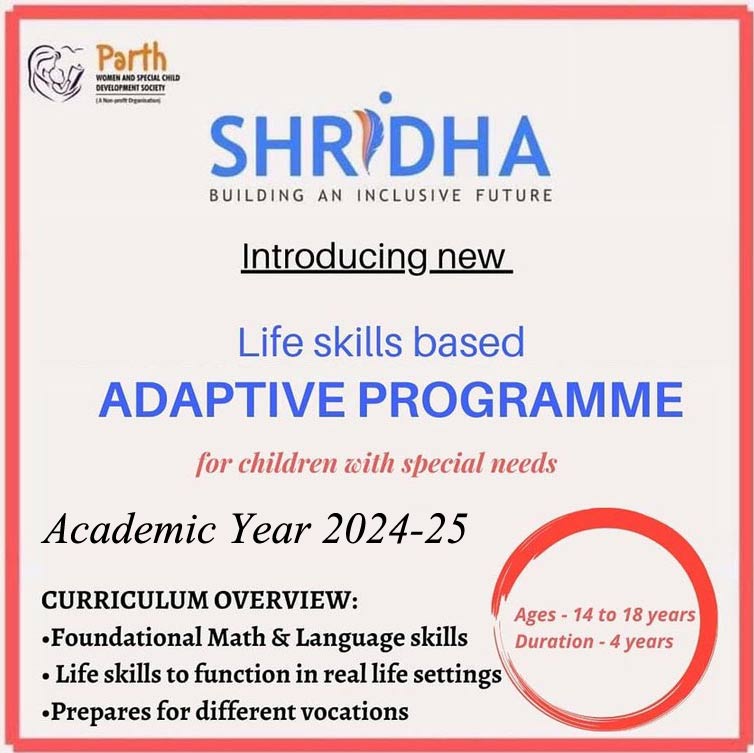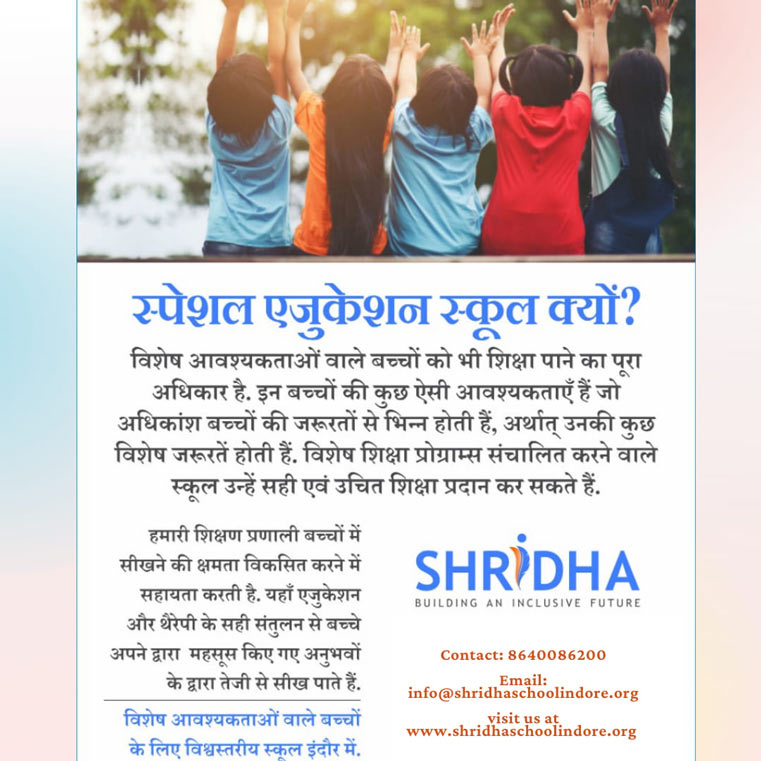Who we are?
Shridha is a School at Indore (Madhya Pradesh) built with the purpose of serving children with learning difficulties.
We envisage and endeavor to change the lives of children with special needs by teaching them the skills they need to deal with the world and feel good and confident about themselves. Each child is different and needs individual approach to learn and to move forward, and we aspire to cater to the needs of each individual’s learning.
Our goal is to ensure that a child’s psychological needs are met such that there is no scope for disillusionment, disengagement, or depression. For this, we use an evidence-based education system which helps us to optimize the child’s learning in a holistic environment.
Education must be an equal opportunity for everyone!
Every child has all the rights to be educated and to live their life to the fullest. Unfortunately, children with learning difficulties struggle at a mainstream school. Parents and even educators do not understand the plight of the child due to lack of awareness.
We provide tailor-made programs embedded with therapies for each child at one place!
We are here to serve, help your child become independent!
Help us to help your child!
(Click on Image to Zoom)
What’s New
Admission Enquiry
Here are some Facts
Over 2.6 % of our population is suffering from one or the other disability.
Almost 50% is not attending School
Quality of Education Services for Special Education leaves lot to be desired
Our Approach to Teaching Learning
Developmental Approach
Harnessing the sensory-motor, speech and language, social-emotional, and cognitive domains to design age-and ability-appropriate instruction.
Observation & Data Based Teaching
Observation-and data-driven instruction, not a prescribed program, guide teaching practices.
Problem-Solving
Emphasizing critical thinking skills throughout the day, in all classes and activities.

Mission
Shridha School caters to the age group 7 to 17 and endeavors to transform the lives of bright students with language-based learning disabilities and attention deficits. At Shridha, our students become skilled, strategic learners and confident self-advocates.
Relying on direct, multisensory instruction and guided by an integrated curriculum, expert faculty teach students the language, literacy, and critical thinking skills that are the foundations for success in mainstream educational settings and beyond.
Shridha believes a close relationship between the school and parents provides essential support as students grow and seek to realize their potential. In small classes and as members of a diverse and inclusive community, Shridha students experience academic and social success, recognize their strengths, and are empowered to become independent learners.
Academics
Shridha’s educational program is a balance of academics, arts and therapies. Our academic curriculum consists of a mix of internationally acclaimed, research-based programs that we have adapted for use in the Indian context. The emphasis is on developing independent problem-solving skills and critical thinking. Content covered in classes is designed to equip students with the knowledge and skills to undertake the NIOS (National Institute of Open Schooling) subjects in Grade 10.

Our Programs
Visual Arts
Our Visual arts program covers art forms such as painting, sculpture, printmaking, ceramics, drawing, design, crafts, photography, video, film making, music and architecture etc.
Occupational Therapy
Our Occupational therapy Program makes use of assessment and intervention to develop, recover, or maintain the meaningful activities, or occupations, of students.
SEL & Counselling Therapy
Our SEL (Social Emotional Learning) & Counselling program involves Managing emotions, Behavioral therapy, Cognitive analytical therapy, Cognitive Behavioral therapy, Cognitive therapy and other integrated approaches.
Speech Therapy
Our speech therapists help kids with different kinds of speech difficulties as well as language issues like dyslexia and dyspraxia, and help improve communication skills..

Development Approach to Learning
At Shridha we firmly believe that with the appropriate interventions, all students can learn, and there is no ceiling or plateau to their learning capacity. Given this belief, we incorporate activities that are developmentally appropriate.
Observation- and Data-Based Teaching
Data-driven decision-making forms the basis of teaching at Shridha and guides all instructional practices. At Shridha, we do not have a ‘one-size-fits-all’ model. But rather, we document our observations of what a child is doing, to better interpret how they learn, and tailor our educational practices accordingly. What a child does gives insight into how they are thinking and learning, and we let these actions, rather than our assumptions, guide us on how to work effectively with a child. Teachers at Shridha work hard to be both, observers and teachers, making detailed notes of what they see, and reflect on how to best support the child.
Strengths-Based Approach
Being a school for children with difficulties, it is easy to only see what needs to be “fixed” in a child. We firmly believe at Shridha, that each individual comes to the table with strengths and it is these strengths that can be harnessed to help a child work on their difficulties. At Shridha, we encourage children to reflect on what they are good at, to see the strengths in other children, and brainstorm how they can use their strengths to support an area of need.
Structure
Students at Shridha often struggle with regulating physical and social behaviors, making connections from one experience to another, and using their past experiences to predict what will happen in a situation (i.e., transferring learning). Physical, social and academic structures at Shridha help scaffold learning for students, allowing them to feel safe in their environment and take risks. Structures at Shridha explicitly teach students to be “just right” before a class begins, or outline for students the expected behaviors when conversing with their peers. In academics, structures guide students in how to plan, organize and check their work.
Learning in a Group
At Shridha, learning takes place in groups. Students learn from, and with, each other. Students who come to Shridha often struggle to work effectively with their peers and nurture and maintain meaningful relationships. Social skills are addressed explicitly, as well as brought into all classes, so students learn and practice them in context.
Class groupings at Shridha are flexible and change based on the needs of the students. Students begin their day in their homerooms, which are mixed-ability groups with similarly aged peers. In homerooms, peers act as role models for each other, and support each other with different aspects of learning. Students also move to ability-matched groups for foundational skills such as language and math. Here, teachers get an opportunity to work explicitly on target skills in a group environment.
Problem-Solving
Our end goal at Shridha is for students to become effective problem-solvers, engaging in critical thinking and reflection. We build problem-solving into all activities throughout the day. The younger students first begin to problem-solve with their bodies, learning how to navigate themselves through space, maneuvering through obstacle courses, or maintaining personal space in a line. Older students apply these same skills to more complex tasks – developing the executive function skills to ask and answer ‘why’ questions, reflecting at the end of a task about what worked and what they might need to change, and making note of other students’ strategies that have worked or not worked and why.
Testimonials
(Click on Image to Play Video)
Contact Us
School : D- 32 HIG Colony, Indore (MP)
Head Office : Parth Women And Special Child Development Society,17/1, Old Palasia, Behind Industry House,Near Airen Yamaha Showroom, Indore (MP)
| M : (+91) 86400 86200 | E-Mail : info@shridhaschoolindore.org |






